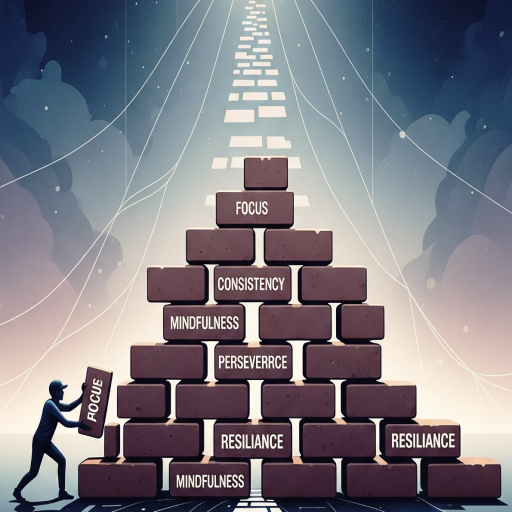
Why do so many people fail to reach
their goals even after making detailed plans? Why do New Year’s resolutions
fade by February, gym memberships go unused, or savings accounts remain empty?
Most people don’t fail because of weak ambitions; they fail because they can’t
sustain the discipline needed to follow through. In 2025, distractions are
everywhere: social media, instant entertainment, and constant notifications
make it harder than ever to stay focused. Without developing strong self discipline BD, even the most
talented individuals fall short of long-term success.
A survey by the American
Psychological Association showed that 27%
of adults blame lack of willpower as the biggest barrier to change. In
Bangladesh, professionals often face the same struggle—balancing family, work,
and personal growth while resisting daily distractions. This is why cultivating
self control BD and practical
discipline habits is no longer optional; it’s essential for growth.
Discipline isn’t built overnight.
When people attempt to transform all their habits at the same time, exhaustion
quickly sets in and progress fades. Begin with small, manageable changes. For
example, a student in Dhaka who wanted to study three hours daily started with
just 30 minutes. Over time, consistency made it easier to expand. This approach
to discipline habits BD builds
confidence and reduces the risk of giving up.
Vague ambitions like “I’ll exercise
more” rarely work. Specific goals create direction. Instead of saying “I want
to save money,” aim for “I will save BDT 5,000 every month.” A young
professional in Chattogram who set a fixed monthly savings target managed to
create an emergency fund within a year, proving how self discipline BD supports financial security.
The ability to say “no” to
short-term pleasure for long-term gain is at the heart of discipline. The
famous Stanford marshmallow experiment
showed children who delayed rewards performed better in life years later. In
Bangladesh, this applies directly: choosing to prepare meals at home rather
than eating out daily strengthens self
control BD and builds savings over time.
Willpower weakens when temptations
surround you. To cut back on social media, consider removing apps from your
phone or placing strict time caps on daily usage. A freelancer in Sylhet
blocked distracting websites during work hours and saw productivity soar. By
reshaping the environment, discipline
habits BD become easier to maintain.
Routines reduce decision fatigue.
Waking up at the same time, following a morning ritual, or dedicating evenings
to learning helps the brain expect structure. A Rajshahi teacher who set fixed
lesson-preparation hours daily found she covered more syllabus with less
stress. Structured routines are one of the most reliable paths to self discipline BD.
Discipline often means refusing
opportunities that don’t align with your goals. A corporate manager in Khulna
declined weekend parties to focus on a professional certification exam. His self control BD helped him qualify
earlier than expected. Every “no” today is often a “yes” to bigger success
tomorrow.
Accountability keeps discipline
alive. One effective way to stay accountable is by telling someone you trust—be
it a close friend, mentor, or coworker—about your goals. A fitness enthusiast
in Barisal committed to daily workouts by joining a gym group where members
tracked each other’s progress. Peer accountability reduced excuses and
strengthened his discipline habits BD.
Positive reinforcement motivates
consistency. A content writer in Sylhet promised herself a small treat after
finishing a big project. Instead of indulging in distractions first, she used
rewards as motivation. Smart incentives encourage self discipline BD without breaking progress.
Discipline doesn’t mean perfection.
Slip-ups will happen, but resilience defines progress. A start-up founder in
Dhaka admitted failing to meet his reading goals for a month. Instead of
quitting, he adjusted his schedule and got back on track. This mindset shows
that self control BD grows
through persistence, not avoiding mistakes.
When the present feels tough, it
helps to keep your attention on the long-term vision rather than the immediate
struggle. Athletes, entrepreneurs, and students succeed because they see where
they want to be in five years. A medical student in Rangpur visualized becoming
a doctor whenever exams felt overwhelming. This mental picture fueled his self
discipline BD and carried him through difficult study periods.

These numbers show that talent alone
isn’t enough - discipline habits BD
are the true drivers of long-term growth.
From finances to career growth to
personal well-being, real success depends on managing impulses and maintaining
steady habits over time. The 10 tips to
build self-discipline for long-term success are not quick fixes - they
are lifelong practices.
For anyone in Bangladesh striving to
balance work, personal growth, and family, adopting self discipline BD and strengthening self control BD will create a foundation for lasting success.
Discipline is not punishment - it’s freedom: freedom from wasted time, broken
promises, and missed opportunities. Start today, and success will follow.
Comments (0)
Leave a Comment
No comments yet
Be the first to share your thoughts!